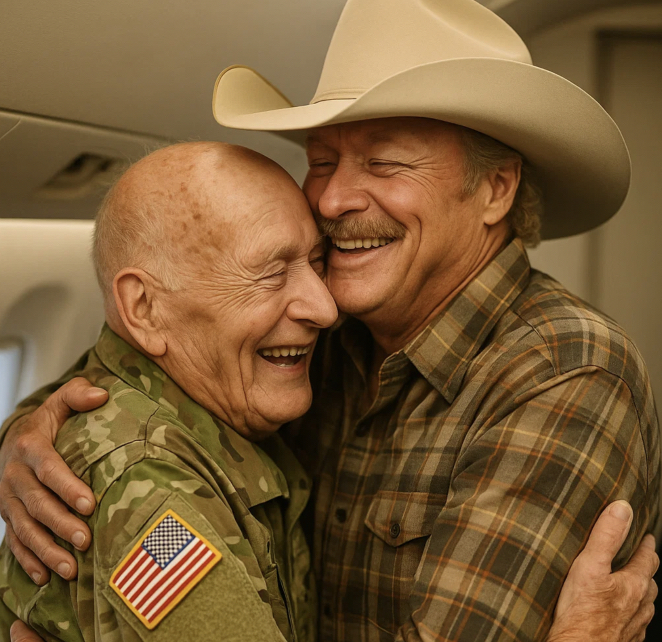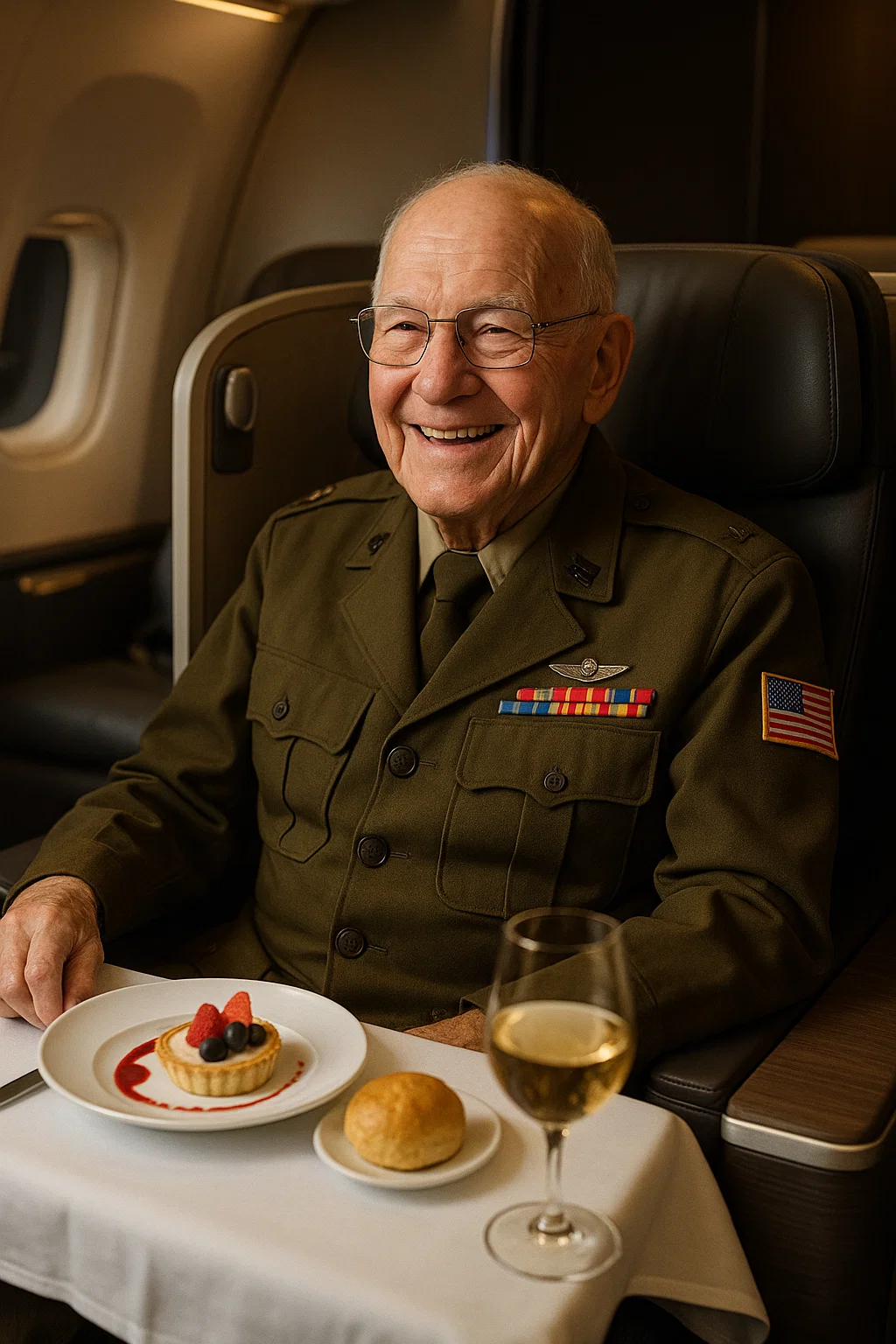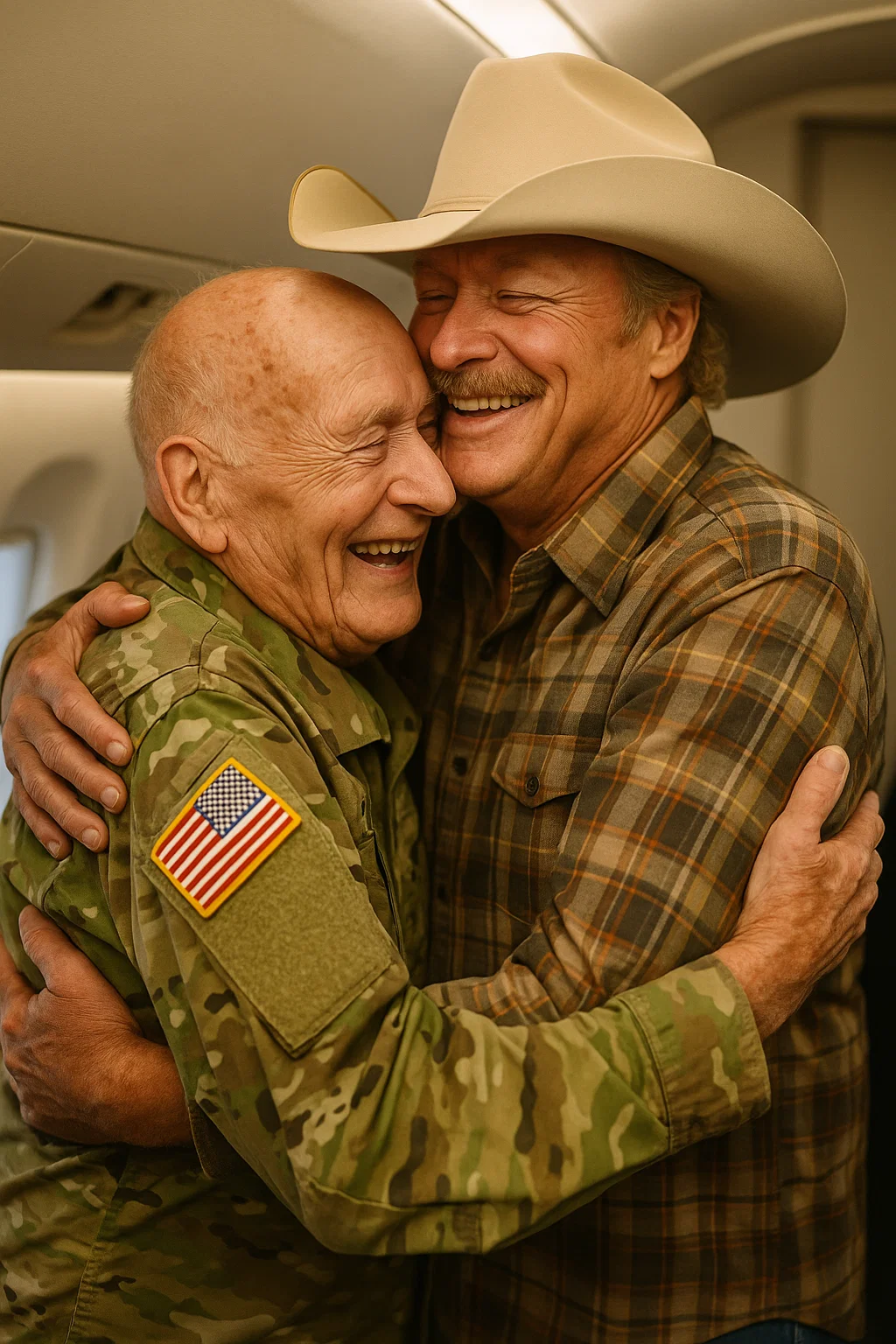
In an epoch where benevolence feels like a vanishing relic, country crooner Alan Jackson reignited faith in sincerity and reverence. It wasn’t under stage lights nor before thunderous applause—his spotlight moment unfolded amidst the subdued hum of an airport terminal, where an unscripted act of esteem would etch itself into the hearts of all who witnessed it.
Alan Jackson, clad not in rhinestones but modesty, was boarding yet another flight amid the tireless rhythms of his touring life. As he navigated the narrow aisle toward his plush first-class berth, a silent sentinel in economy caught his discerning gaze—an elder, weather-worn veteran, marked not by medals but by quiet dignity, adorned only with a cap bearing the emblems of service. No grand gestures, no entourage—just one man among many, whose past bore the weight of a nation’s freedom.
Without deliberation, Jackson pivoted. A man long known for his generosity and grounded soul, he leaned toward the veteran with a warmth unfeigned. “May I have a word with you, sir?” he murmured with respect. Locking eyes, he expressed his heartfelt gratitude. “Your sacrifice is the bedrock on which men like me chase their dreams,” Jackson said—his voice soft but resolute.

Then came the seismic moment—Jackson extended an offer unexpected and poignant. “Sir, my first-class seat is yours. I’d be honored if you’d accept it.” The older man blinked, stammered, clearly jarred by the magnanimity. He tried, earnestly, to decline. Yet Jackson stood firm, not out of insistence, but reverence. “This is not charity,” he replied, “This is me acknowledging the immeasurable debt owed.”
Aboard that aircraft, something transcendent occurred. The transaction of gratitude was not merely a transfer of seats—it was a moment suspended in grace. But Jackson’s humility went further still. He chose not to resume his elevated spot but instead settled beside the veteran’s former place in economy. There, stripped of pretense, the two men conversed—an exchange unfurling like a tapestry woven from tales of war and lyrics of life.
The veteran, now ensconced in comfort, was visibly touched. His hands trembled as he repeated his thanks, yet Jackson deflected the praise with his signature down-to-earth poise. “Respect is not a courtesy—it’s a duty,” he said with the weight of lived principle.
Throughout the journey, Jackson remained tethered not to celebrity, but to humanity. He returned to check on the veteran, offering refreshments, small comforts, and warm conversation. It was not the behavior of a performer seeking applause but that of a man guided by an inner compass of compassion.
The stories shared between them weren’t curated or grandiose. The veteran recalled dusty battlescapes, long nights under foreign skies, the ache of sacrifice, and the cost of peace. Alan listened—not as a star but as a fellow American—eyes meeting with a reverence seldom seen in our era of fleeting connections.
As the plane touched down, Jackson ensured the veteran’s descent was smooth, both literally and metaphorically. He assisted with his belongings, exchanged a parting handshake that lingered with emotion. “You’ve given me a gift today,” the veteran said, voice faltering under the weight of sentiment. “I won’t forget it.”

The reverberations of this moment cascaded swiftly across social networks. Eyewitnesses took to digital avenues, recounting the episode with awe and admiration. Jackson’s fans rallied behind this new story, not for its virality, but for its authenticity. Many called it a rare glimmer of light in a world dimmed by division.
Alan Jackson’s legend is carved not only into vinyl and airwaves but in countless philanthropic gestures—supporting hospitals, veteran causes, disaster relief. Yet this spontaneous gesture eclipsed them in intimacy. It wasn’t orchestrated or broadcast. It was raw, real, and deeply human.
To most, surrendering a luxurious airline seat may seem trivial. But to the recipient—whose sacrifices are often unseen—it was affirmation, a mirror reflecting back worth and dignity. It told a veteran, “You are not forgotten.”
The tale’s enduring power lies not in celebrity spectacle but in the raw purity of shared respect. In an age awash with cynicism, Jackson reminded the world that humility requires no spotlight. It lives in unguarded acts, quiet dignity, and moments like this—where two men from disparate paths find unity in honor.
Alan Jackson gave more than a seat—he offered reverence, kinship, and a fleeting oasis of recognition in the rush of anonymity. And in doing so, he did what great artists always do—he turned life itself into a song worth remembering.
